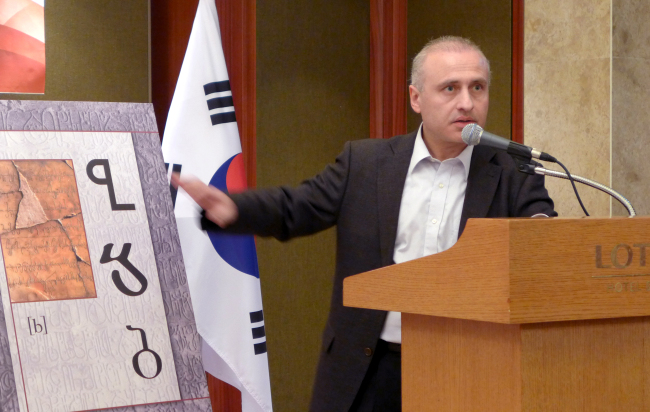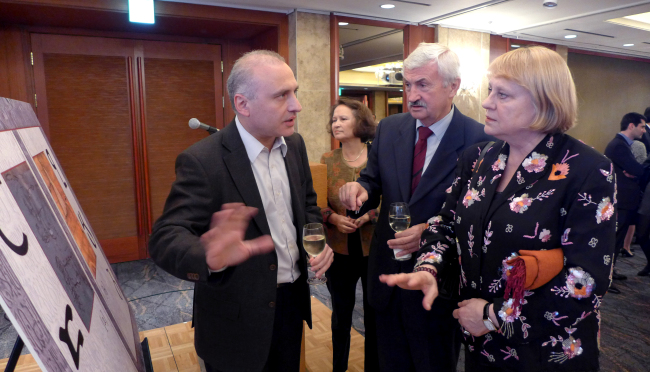Like Korea’s Hangul, Georgia has its own alphabet. Although the script’s precise origins are unclear, it has existed for some 2,500 years, inscribed in ancient scriptures.
The writing is one of the 14 predominant writing scripts around the world. It employs 33 letters that are pronounced exactly the same as in writing, being a phonemic alphabet “literally.”
The Tbilisi government listed it as a national cultural heritage in March, and nominated it for the UNESCO Intangible Cultural Heritage List, which will be determined next year.
The Georgian Embassy held a reception at Lotte Hotel on Wednesday to promote the cause and raise awareness in Korea.
 |
| Georgian Ambassador Nikoloz Apkhazava. Joel Lee/The Korea Herald |
“The history of Georgia was one of survival,” Georgian Ambassador Nikoloz Apkhazava told The Korea Herald.
“Being at the crossroads of Asia and Europe, with different conquerors and civilizations,” he added, “We have survived on the same land, as the same people, with the same language and culture, for over three millennia. We are proud of that.”
Georgian historical records date the invention of the alphabet to the pre-Christian period, notably to the Iberian King Parnavaz of third century B.C. Another view points to a time after Georgia was Christianized in the fourth century A.D.
No agreement to date has been reached on a common origin, but the writing was noteworthy from a research perspective, the ambassador explained, for being a relic of perished languages in forgotten histories.
“With Georgia being the cradle of wine going back over 8,000 years, some scholars have suggested that our alphabet was closely tied to our viticulture, with the round characters resembling the wine trees,” he said.
The alphabet, which predominantly uses the “Mkhedruli” version more than the sister variations of “Asomtavruli” and “Nuskhuri,” does not have capital letters, gender distinctions or articles.
“It is the only language in the world where the word ‘mama’ actually means ‘father,’” Apkhazava highlighted, delighting the participants, comprised of diplomats and individuals close to Georgia.
 |
| Georgian Ambassador Nikoloz Apkhazava (left) explains the Georgian alphabet to the Romanian Ambassador’s spouse Mihaela Fabianto (second from left), Polish Ambassador Krzysztof Ignacy Majka and his wife Zofia Majka. Joel Lee / The Korea Herald |
The Georgian language belongs to the Iberian-Caucasian linguistic family, separate from the Indo-European languages. Centuries of interactions with the Greeks, Persians, Arabs, Russians, Turks and Azerbaijanis have ingrained and imprinted their traces on the vocabulary, but not the script itself, the envoy noted.
According to the Georgian Ministry of Education and Science, a modern Georgian can understand both the ecclesiastical and secular literature in the Old Georgian (5-11th centuries A.D.) and Middle Georgian (12-18th centuries A.D.) languages.
Like Korea’s “Hangul Day” on Oct. 9, Georgia celebrates the “Day of the Georgian Language” on April 14. Young Georgians have increasingly opened their eyes and ears to the outside world, and many are comfortable with English, Apkhazava said.
The Tbilisi Free University has a Korean language department, where around 25 Georgian students study each year with the help of a Korean teacher.
By Joel Lee (joel@heraldcorp.com)

